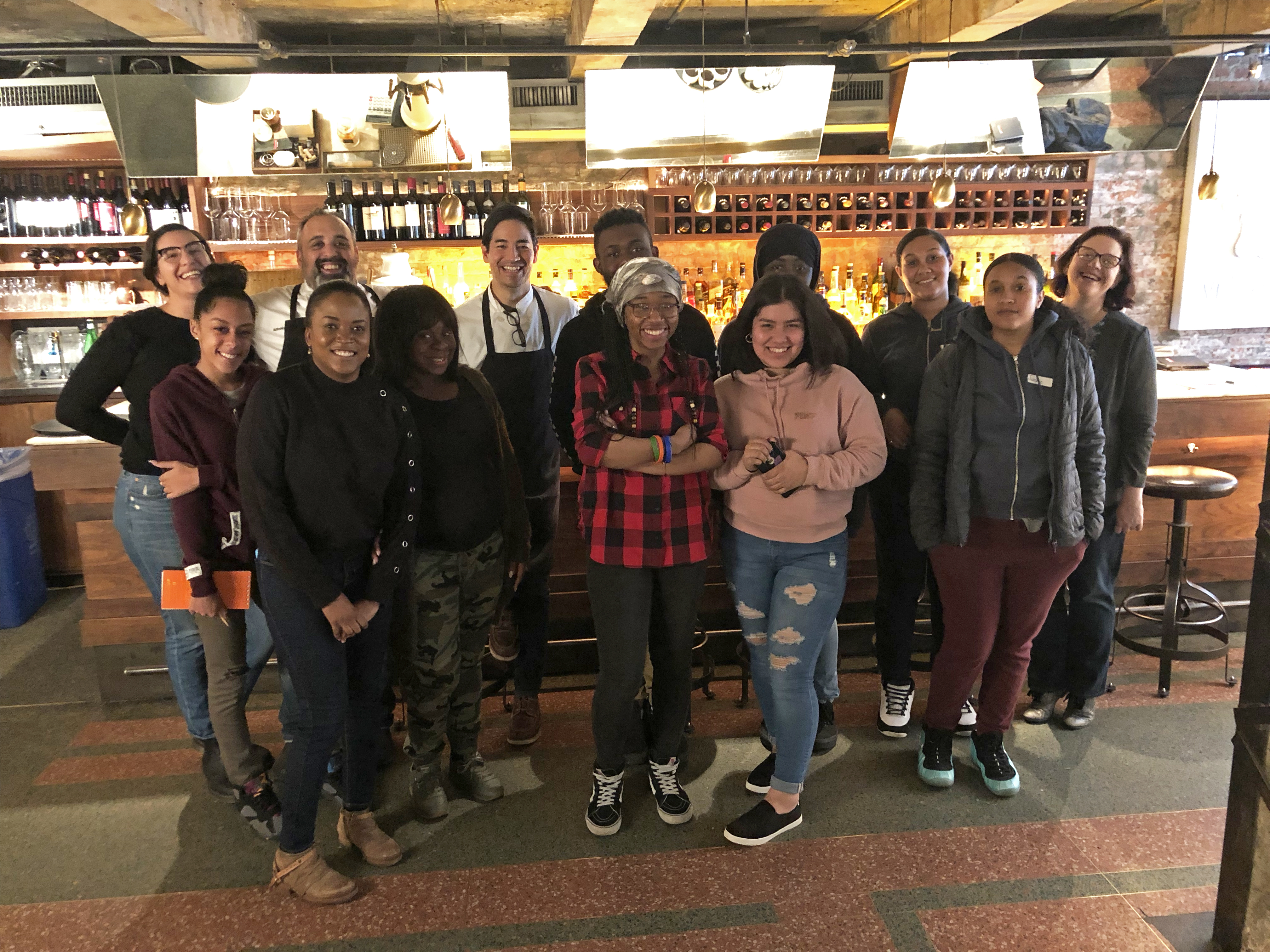
The Teen Apprenticeship program is in full swing at The Sylvia Center. With over 20 weeks of training and practice this school year, our teens are learning the basics of cooking healthy, delicious foods. They will then teach these skills to younger students at day camps in underserved communities across the city this summer.
To enrich their learning and connect them to opportunities, our teens recently visited Quality Meats NYC to get a behind-the-scenes lesson on what it takes to run a restaurant. The teens met with Executive Chefs Antonio Mora and Craig Koketsu, who shared their inspirations for cooking and the importance of developing skills that go beyond the kitchen. From the ingredients, to the tools, to the food on the plate, students learned about every aspect of the restaurant business.
The Sylvia Center apprentices learned what it means to cook consciously, paying attention to both ingredients and food costs. For example, making the most of the ingredients you have on-hand can decrease waste and maximize profitability. Chef Antonio gave one example of budgeting costs in a restaurant with the purchase of a whole chicken. A chicken purchased for $8 can actually make $60 – $100 worth of menu items at Quality Meats with proper planning. Just one chicken can make: two orders of chicken, stock, appetizers, and even staff meal. With the right preparation, even the cheaper cuts of the chicken can be made into something delicious!
“The more you know how to cook, the better you know how to feed yourself and the people around you. That is the skill that lasts a lifetime and that’s a skill that people appreciate.” -Chef Craig
Among other factors, flavor, texture, and color can create a balanced and proportioned plate. Case in point: the dish being prepared with students on the day of the visit included a sauce that was acidic and sweet, with a small garnish to give it texture. Just before plating, Chef Craig sliced the chicken at an angle and fanned out the overlapping slices so the chicken would appear bigger. Students learned that every detail of preparation, from skilled butchery to artful garnish, makes a difference in presentation, price, and customer satisfaction.
Chefs Antonio and Craig demonstrated respect for the ingredients and how they were prepared and presented, and they reiterated how important this is as a chef. Students learned that every responsibility in the kitchen is like ingredients in a recipe–they each serve their purpose and can add an exciting dynamic.
Every Ingredient, Every Job, Every Person Matters
This core value in the kitchen can also be reflected in how people work together, by showing each other respect.
Both Chef Antonio and Chef Craig moved through various posts in the kitchen before becoming successful chefs in the restaurant industry. Neither could afford to attend culinary school, so they both started their restaurant careers by washing dishes. According to Chef Craig, the most important station is dishwashing!
“We call this the lungs of the kitchen. If you stop breathing everything else will stop–you are not supplying oxygen to your brain, to your heart or muscles–you will shut down and that’s exactly what that is,” he says. “The dishwasher supplies oxygen to the entire restaurant.”
By working as dishwashers, the chefs say they learned speed and efficiency. Both of these are invaluable skills when cooking in restaurants anywhere.
Learning to Use Real Tools and How to Take Care of Them
Part of becoming a chef is learning to take care of the tools that you have, and showing them respect, just like everything else in the kitchen. For example, mastering knife sharpening with precision can help you complete tasks faster and easier. It will also allow you to extend the life of your knife — saving time and money.
Chef Antonio demonstrated various specialized knives and other tools, but explained that for eight years, his chef allowed him to use only two for everything — a chef’s knife and a paring knife.
As Antonio says, “the knife is an extension of your hand, and should feel good in your hand.”
By the end of the day, The Sylvia Center teens gained new insights from two seasoned professionals, and a deep appreciation for the teamwork behind the scenes at a restaurant and an understanding of how to apply these skills to any job or any task in life. They saw that even in a commercial kitchen, food is more than the ingredients transformed into something delicious: it provides a deeper connection to others through sharing and learning together.
As Chef Craig says, “People really appreciate the effort you make in putting forth something that tastes delicious. It shows that you care about them.”


